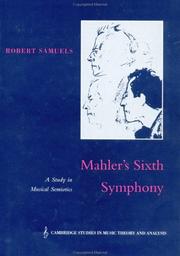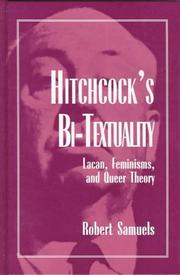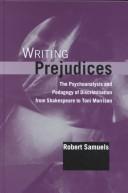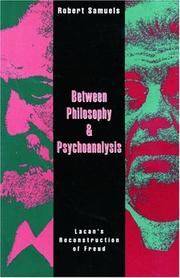| Listing 1 - 10 of 35 | << page >> |
Sort by
|

ISBN: 052148166X 0521602831 0511597304 0511887507 Year: 1995 Volume: 6 Publisher: Cambridge : Cambridge University Press,
Abstract | Keywords | Export | Availability | Bookmark
 Loading...
Loading...Choose an application
- Reference Manager
- EndNote
- RefWorks (Direct export to RefWorks)
The terms of structuralist and post-structuralist theory have been widely debated within the field of music analysis in recent years. However, very few analyses have attempted to address the repertoire of large orchestral works of the turn of the century - works which seem most obviously to escape the categories of conventional analysis. This study uses a semiotic theory of signification in order to investigate different types of musical communication. Musical meaning is defined on several levels from structures immanent to the work, through questions of tradition and genre, to consideration of the symphony as a narrative alongside other contemporary non-musical texts. Ideas from Eco, Barthes, and Derrida are deployed within the context of close analysis of the score in order to unite specifically analytical insights with cultural hermeneutics.
Music --- Symphonies --- Semiotics. --- Analysis, appreciation. --- Analysis, appreciation --- Semiotics --- Mahler, Gustav --- Mahler, Gustav,
Book
ISBN: 3319448072 3319448080 Year: 2016 Publisher: Cham : Springer International Publishing : Imprint: Palgrave Macmillan,
Abstract | Keywords | Export | Availability | Bookmark
 Loading...
Loading...Choose an application
- Reference Manager
- EndNote
- RefWorks (Direct export to RefWorks)
This book outlines a new model for global social justice movements that is based on Freud and Lacan’s central insights regarding the unconscious, repetition, drives, and transference. Since most of our current social issues are global in nature, Bob Samuels convincingly argues that we need a global solution, but that global solidarity is blocked by narcissistic nationalism and the capitalist death drive. In examining contemporary social movements for global justice, Samuels articulates a comprehensive theory of non-pathological social solidarity, and argues that in the age of multinational corporations and global climate change, we need a new model of global justice and government that requires an understanding of analytic neutrality and free association. This book uses psychoanalytic theories and practices to explain how someone like Trump can rise to power, and explores why liberals have failed to provide a convincing or effective political alternative. It will be compelling reading to students and teachers in a range of psychological and political disciplines, and to anyone interested in psychoanalysis and current politics. Robert Samuels teaches writing at the University of California, Santa Barbara, USA. He is also President of UC-AFT, the union representing 4,000 librarians and lecturers (non-tenured faculty) in the UC system, and has authored seven books, including Why Public Higher Education Should Be Free. .
Psychology. --- Political theory. --- Psychoanalysis. --- Social justice. --- Human rights. --- Critical psychology. --- Critical Psychology. --- Political Theory. --- Social Justice, Equality and Human Rights. --- Political psychology --- Populism --- Presidents --- Election --- Trump, Donald, --- Presidency --- Mass political behavior --- Political behavior --- Political science --- Politics, Practical --- Psychology, Political --- Psychological aspects --- Trump, Donald J., --- Tramp, Donalʹd, --- Трамп, Дональд, --- 川普唐納德, --- The Donald, --- Donald, --- Trump, Donald John, --- Heads of state --- Executive power --- Psychology --- Social psychology --- Equality --- Justice --- Administration --- Civil government --- Commonwealth, The --- Government --- Political theory --- Political thought --- Politics --- Science, Political --- Social sciences --- State, The --- Psychology, Pathological --- Psychology, Critical --- Communism and psychology --- Basic rights --- Civil rights (International law) --- Human rights --- Rights, Human --- Rights of man --- Human security --- Transitional justice --- Truth commissions --- Law and legislation

ISBN: 0791436098 0791436101 Year: 1998 Volume: *3 Publisher: Albany State University of New York Press
Abstract | Keywords | Export | Availability | Bookmark
 Loading...
Loading...Choose an application
- Reference Manager
- EndNote
- RefWorks (Direct export to RefWorks)
Psychoanalyse --- psychoanalytische theorie. --- Hitchcock, Alfred Joseph --- Criticism and interpretation
Book
ISBN: 3319718916 3319718908 Year: 2017 Publisher: Cham : Springer International Publishing : Imprint: Palgrave Pivot,
Abstract | Keywords | Export | Availability | Bookmark
 Loading...
Loading...Choose an application
- Reference Manager
- EndNote
- RefWorks (Direct export to RefWorks)
This book argues that neuroscience, evolutionary psychology, and behavioral economics often function as a political ideology masquerading as a new science. In looking at works by Antonio Damasio, Steven Pinker, Richard Thaler, Cas Sunstein, and John Tooby, Robert Samuels undertakes a close reading of the new brain sciences, and by turning to the works of Freud and Lacan, offers a counter-discourse to these new emerging sciences. He argues that an unintentional political manipulation of scientific thinking serves to repress the psychoanalytic conception of the unconscious and sexuality as it reinforces neoliberalism and promotes the drugging of discontent. This innovative book is intended for those interested in science, psychoanalysis, and politics and offers a new definition of neoliberal subjectivity.
Psychoanalysis. --- Neurosciences. --- Evolutionary psychology. --- Psychology. --- Political theory. --- Critical psychology. --- Critical Psychology. --- Economic Psychology. --- Cultural Policy and Politics. --- Political Theory. --- Psychology --- Psychology, Pathological --- Human evolution --- Neural sciences --- Neurological sciences --- Neuroscience --- Medical sciences --- Nervous system --- Economics—Psychological aspects. --- Cultural policy. --- Administration --- Civil government --- Commonwealth, The --- Government --- Political theory --- Political thought --- Politics --- Science, Political --- Social sciences --- State, The --- Intellectual life --- State encouragement of science, literature, and art --- Culture --- Popular culture --- Psychology, Critical --- Communism and psychology --- Government policy
Book
ISBN: 3030243818 3030243826 Year: 2019 Publisher: Cham : Springer International Publishing : Imprint: Palgrave Pivot,
Abstract | Keywords | Export | Availability | Bookmark
 Loading...
Loading...Choose an application
- Reference Manager
- EndNote
- RefWorks (Direct export to RefWorks)
“With this nimble volume, Samuels emerges as a peerless Freudian life coach. Without ever abandoning Freud’s own belief in the value of science, and engaging with key contemporary advocates of the enlightenment doctrine, he articulates the so desperately needed, poetic wisdom for our times. This is a book to be read and re-read, ad infinitum.” —Dany Nobus, Professor of Psychology at Brunel University, and Chair of the Freud Museum London, UK This book places Freud’s theory of the reality principle in relation to both everyday experience and global issues of the 21st century and illustrates how it may be practically applied. Arguing against more critical recent accounts of Freud’s science, the author seeks to show how one might apply the scientific method to everyday life. It demonstrates how Freud contributes to a better understanding of reason and how this in turn can be used to unravel the role of unreason in both politics and personal relationships. Including critical examinations of topics such as Narcissism, Victimhood and Empathy, this engaging reappraisal of Freud’s relevance to contemporary life offers fresh insights for psychology, psychoanalysis and cultural theory; as well as practical guidance for a general reader. Robert Samuels is Lecturer in advanced writing at the University of California, Santa Barbara, USA. He holds doctorates in Psychoanalysis and English. He is the author of 11 books, including Psychoanalyzing the Politics of the New Brain Sciences (2017).
Freud, Sigmund, --- Critical psychology. --- Psychoanalysis. --- Psychology, clinical. --- Psychology, Applied. --- Culture-Study and teaching. --- Philosophy of mind. --- Critical Psychology. --- Clinical Psychology. --- Applied Psychology. --- Cultural Theory. --- Philosophy of Mind. --- Mind, Philosophy of --- Mind, Theory of --- Theory of mind --- Philosophy --- Cognitive science --- Metaphysics --- Philosophical anthropology --- Applied psychology --- Psychagogy --- Psychology, Practical --- Social psychotechnics --- Psychology --- Psychology, Pathological --- Psychology, Critical --- Communism and psychology --- Clinical psychology. --- Culture—Study and teaching. --- Psychiatry --- Psychology, Applied --- Psychological tests
Book
ISBN: 3030509109 3030509095 Year: 2020 Publisher: Cham : Springer International Publishing : Imprint: Palgrave Macmillan,
Abstract | Keywords | Export | Availability | Bookmark
 Loading...
Loading...Choose an application
- Reference Manager
- EndNote
- RefWorks (Direct export to RefWorks)
This book builds on a critique of Slavoj Zizek’s work to outline a new theory of psychoanalytic rhetoric. It turns to Zizek because not only is he one of the most popular intellectuals in the world, but, this book argues, his discourse is shaped by a set of unconscious rhetorical processes that also determine much of contemporary politics, culture, and subjectivity. Just as Aristotle argued that the three main forms of persuasion are logos (reason), pathos (emotion), and ethos (authority), Samuels describes each one of these aspects of communication as related to a fundamental psychoanalytic concept. He also turns to Aristotle’s work on theater to introduce a fourth form of rhetoric, catharsis, which is the purging of feelings of fear and pity. Adding a strong voice to current psychoanalytic debate, this book will be of value to all scholars and students interested in both the history and modern developments of psychoanalytic theory. Robert Samuels has doctorates in Psychoanalysis and English. He teaches advanced writing and rhetoric at the University of California, Santa Barbara, USA. He is the author of fifteen books, including Freud for the Twenty-First Century.
Žižek, Slavoj. --- Žižek, Slavoj --- Critical psychology. --- Psychoanalysis. --- Culture—Study and teaching. --- Critical Psychology. --- Cultural Theory. --- Psychology --- Psychology, Pathological --- Psychology, Critical --- Communism and psychology --- Culture --- Study and teaching. --- Cultural studies --- Psicologia analítica --- Retòrica --- Zizek, Slavoj --- Preceptiva literària --- Anàlisi del discurs literari --- Començament (Retòrica) --- Conferències --- Debats --- Descripció (Retòrica) --- Dicció --- Elocució --- Ironia --- Oratòria --- Repetició (Retòrica) --- Retòrica antiga --- Retòrica medieval --- Puntuació --- Anàlisi jungià --- Psicoanàlisi jungià --- Psicologia complexa --- Psicologia de les profunditats --- Psicologia jungiana --- Teoria jungiana --- Psicoanàlisi

ISBN: 0791448754 0791448762 9780791448755 9780791448762 0791491072 9780791491072 Year: 2001 Publisher: Albany, New York : State University of New York Press,
Abstract | Keywords | Export | Availability | Bookmark
 Loading...
Loading...Choose an application
- Reference Manager
- EndNote
- RefWorks (Direct export to RefWorks)
"Writing Prejudices addresses critical attempts to undermine prejudice through education in general, and literary studies in particular. Robert Samuels argues that these attempts often fail because they do not take into account the different forms of prejudice, the role played by homophobia in racism and sexism, the structure of what Lacan calls symbolic castration, and the unconscious foundations of cultural formations. Addressing these deficiencies, Samuels uses psychoanalytic theory to examine the manifestations of racism, sexism, ethnocentrism, and homophobia in the works of Shakespeare, Mary Shelley, Joseph Conard, and Toni Morrison, showing how these distinct modes of oppression feed off of each other and the diverse ways that cultural critics can work to undermine them."--Jacket.
Discrimination in literature. --- English literature --- Homophobia in literature. --- Prejudices in literature. --- Psychoanalysis and literature --- Racism in literature. --- Psychoanalyse --- History and criticism --- Theory, etc. --- cultuur en religie. --- Homophobia in literature --- Racism in literature --- Prejudices in literature --- Discrimination in literature --- English Literature --- English --- Languages & Literatures --- Literature and psychoanalysis --- Psychoanalytic literary criticism --- Literature --- British literature --- Inklings (Group of writers) --- Nonsense Club (Group of writers) --- Order of the Fancy (Group of writers) --- Theory, etc --- Morrison, Toni --- Wofford, Chloe Anthony --- Morrisonová, Toni --- מוריסון, טוני --- Criticism and interpretation.

ISBN: 0585089841 9780585089843 0791436098 0791436101 1438418566 Year: 1998 Publisher: Albany State University of New York Press
Abstract | Keywords | Export | Availability | Bookmark
 Loading...
Loading...Choose an application
- Reference Manager
- EndNote
- RefWorks (Direct export to RefWorks)
This book combines three elements: an articulation of Lacan's theory of ethics; a discussion of recent theories of feminine subjectivity and queer textuality; and close readings of Hitchcock's films. Hitchcock's Bi-Textuality argues that just as Freud posited a fundamental ground of bisexuality for every subject, we can affirm a form of universal bi-textuality that is repressed through different modes of representation, yet returns in unconscious aspects of textuality (dreams, word play, jokes, and symbolism). In order to illustrate this notion of bi-textuality, this work discusses how Hitchcock's films are extremely heterogeneous and present multiple forms of sexual identification and desire, although they have most often been read through the reductive lens of male heterosexuality.Throughout this book, the work of Julia Kristeva, Kaja Silverman, Judith Butler, Luce Irigaray, and Slavoj Zizek is examined. One of the central concerns is the way that different psychoanalytic and feminist theories tend to equate the Real and the unconscious with the feminine. This feminization of the Real tends to block the awareness of the bisexual nature of the unconscious. In order to return to Freud's fundamental theory of polyvalent sexuality, recent notions of queer sexuality and textuality are explored. This book extends psychoanalytic theory by incorporating new feminist and queer conceptions of sexuality and representation.
Hitchcock, Alfred, 1899-1980 --- Lacan, Jacques, 1901-1981 --- Performing Arts --- Psychology --- Hitchcock, alfred, 1899-1980 --- Lacan, jacques, 1901-1981 --- Performing arts

ISBN: 041590675X 0415906768 Year: 1993 Publisher: New York (N.Y.): Routledge
Abstract | Keywords | Export | Availability | Bookmark
 Loading...
Loading...Choose an application
- Reference Manager
- EndNote
- RefWorks (Direct export to RefWorks)
Psychoanalysis and philosophy --- Philosophy and psychoanalysis --- Philosophy --- Freud, Sigmund --- Lacan, Jacques --- Psychoanalysis and philosophy. --- Freud, Sigmund, --- Lacan, Jacques, --- Psychoanalyse --- psychoanalytische theorie.
Book
ISBN: 1003100449 1000259927 1000259943 9781003100447 9781000259926 9781000259940 9781000259933 1000259935 9780367568856 Year: 2021 Publisher: New York, NY : Routledge,
Abstract | Keywords | Export | Availability | Bookmark
 Loading...
Loading...Choose an application
- Reference Manager
- EndNote
- RefWorks (Direct export to RefWorks)
"This timely intervention into composition studies presents a case for the need to teach all students a shared system of communication and logic based on the modern globalizing ideals of universality, neutrality, and empiricism. Based on a series of close readings of contemporary writing by Stanley Fish, Asao Inoue, Doug Downs and Elizabeth Wardle, Richard Rorty, Slavoj Zizek, and Steven Pinker, this book critiques recent arguments that traditional approaches to teaching writing, grammar, and argumentation foster marginalization, oppression, and the restriction of student agency. Instead, it argues that the best way to help and protect a diverse global student body is to promote a mode of academic discourse dedicated to the impartial judgment of empirical facts communicated in an open and clear manner. It provides a critical analysis of core topics in composition studies, including the teaching of grammar; notions of objectivity and neutrality; empiricism and pragmatism; identity politics; and postmodernism. Aimed at graduate students and junior instructors in rhetoric and composition, as well as more seasoned scholars and program administrators, this polemical book provides an accessible staging of key debates that all writing instructors must grapple with"--
Rhetoric --- Academic writing --- Learned writing --- Scholarly writing --- Authorship --- Language and languages --- Speaking --- Expression --- Literary style --- Study and teaching (Higher) --- Social aspects
| Listing 1 - 10 of 35 | << page >> |
Sort by
|

 Search
Search Feedback
Feedback About UniCat
About UniCat  Help
Help News
News